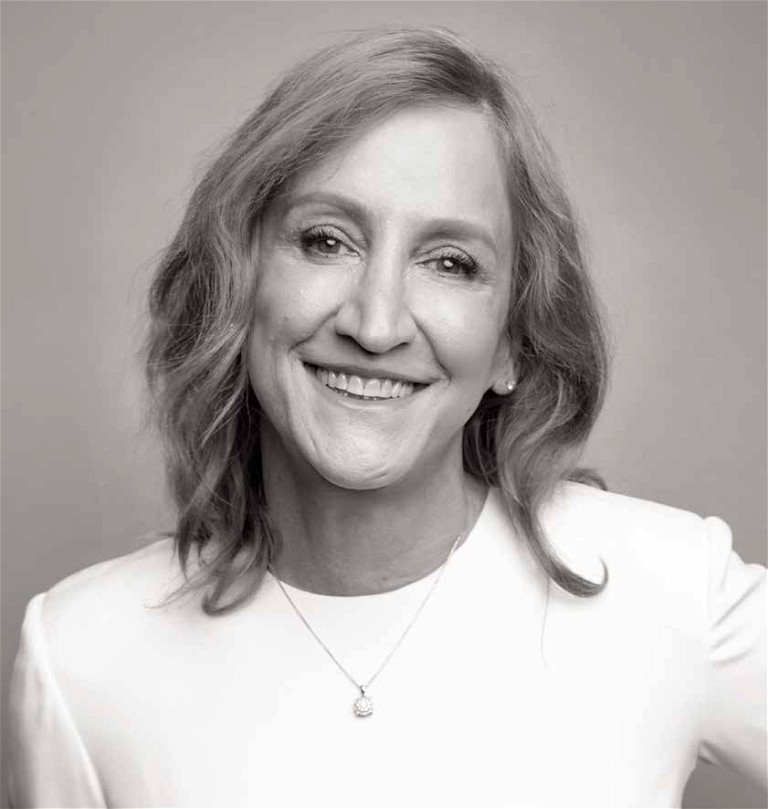THE POWER of Vulnerability
Can a senior banking executive affirm their true gender mid-career? Katie Dudtschak says yes
By Sarah B. Hood

Some would say it was not possible; many would call it inadvisable. But with more than 30 years’ experience at progressively senior levels at a major Canadian bank, Katie Dudtschak decided to publicly affirm her identity. It didn’t go as she expected.
“I had come out to my spouse in 2017, and later to my kids. In October of 2018, I made the decision to affirm my true gender after months of trying to cope and being near suicide. Because I lead a workforce of more than 20,000 people, I was worried about those people, let alone the executives who work for me,” says Dudtschak, who is the executive vice president of regional banking, personal and commercial banking, at RBC. “I was worried they’d think I was crazy. I was worried that they would lose respect for me. The reality of what happened was the complete opposite.”
By February of 2019, Dudtschak had started hormone therapy and shared the truth with her CEO, the head of HR and her immediate boss. In the summer of 2019, she came out to the world as Katie. The progress was careful and deliberate. Initially, she says, “I expected that I would have to send a letter to 20,000 employees on my own, but what happened was that my CEO and my head of HR did that for me.”
In fact, a team of colleagues was involved. A senior HR executive who was planning to retire even chose to stay to participate in the process. With the assistance of senior leadership, the board of directors was informed. In order to communicate with RBC’s more than 80,000 employees, Dudtschak recorded a video in which she disclosed her truth. Her CEO and her boss chose to appear as well to show their support for her and RBC’s values of inclusion and diversity.
“They had complete respect for the fact that my coming out was my personal story. They helped me tell my story with care, compassion and their visible support,” says Dudtschak. “So what happened was thoughtful leadership. What happened was an unprecedented reaction from thousands of people from across the corporation.”
“ I now realize that as a senior business leader – probably the most senior business leader in the world to have transitioned – my story has the ability to help other people. ”
-KATIE DUDTSCHAK
AFFIRMATION, NOT TRANSITION
Dudtschak makes the point that “gender transition” is not the way she describes her coming out. “I did not transition,” she says. “I affirmed my gender.” Thus she describes herself not as transgender but instead as “a women with genderaffirming experience.”
After many years of presenting a male persona to the world, “my commitment to face my truth came after the worst point in my life,” explains Dudtschak. “I knew my true gender was female, and I felt the world was going to reject me and that I would hurt my children and my spouse.” In her worst moments, she says she believed she “would be homeless.”
Dudtschak says suicidal thoughts are common for people who cannot live their true gender, who develop gender dysphoria. She describes it as “a really bad case of homesickness, or in the worst case, living like a caged animal. You also are living with fear, fearing that you will hurt your children or family, that your job will not be ready for you, that you will be fired.”
Dudtschak believes that one of the factors that made her own gender affirmation in the workplace so seamless was that she chose to lead from vulnerability and humility rather than power. “Because I showed vulnerability and transparency into my life, people felt comfortable to reach out to me directly. They commented to me that I was going to save other peoples’ lives,” she says. “I now realize that as a senior business leader – probably the most senior business leader in the world to have transitioned – my story has the ability to help other people.”
Many other people have since come forward to Dudtschak to tell their own stories – not exclusively people struggling with gender dysphoria, but also women, Indigenous people, people with mental health challenges and people from many other sectors of society. “I was blessed to receive their stories, for other people to show their vulnerability to me and to hear their own experiences with rejection,” she says. “My experience has been extraordinarily positive because people were trained, because the organization took the communication process seriously.”
When is the right time? To anyone who is considering coming out, Dudtschak says, “Only you will know what the right time is, because there is a very good chance you will be completely plagued by fear. My time came after being nearly suicidal and knowing my own truth for a while.”
Dudtschak points out that Canadian human rights laws protect people from gender discrimination in the workplace and that, “you may find you have more support at work than you will have from your immediate family.”
This is because close friends and family members will have their own challenges in adjusting to a change that may also affect them in many ways, whereas work colleagues need only be reassured that the same competent and reliable individual is still there to fulfill their working responsibilities as they always have.
CORPORATE CONSIDERATIONS
Dudtschak says that companies that have not yet moved on this issue need to start by publishing policies and programs supporting the gender affirmation process. This includes supporting the process of communication and the individual’s right to tell their story in their way. It should also include adjustments to benefits coverage for surgeries and mental health supports.
Programs should not only be made available to the employees, but also to managers, who also need support. Furthermore, the whole team – whatever size it may be – will benefit from training. “Whether you’ve got five peers or 50,000, the basics around training, benefits and communication are all the same, so I would invest in all of those things,” says Dudtschak.

In building policy, Dudtschak stresses that diversity is easy; true inclusion is the hard part. “The real question for workplaces is, ‘Are you creating a safe, kind place that embraces and gets to know the whole human being who works for you?’”
Canada is “an extraordinarily diverse country,” notes Dudtschak, “but diversity is not actually very helpful to your community and your cause unless the whole person feels included, unless they feel psychological safety, seen, heard and respected as a whole person.”
Dudtschak’s decision to affirm her true gender, supported broadly by RBC senior management and employees, shows the importance of humility and humanity. “Vulnerability is a strength, not a weakness,” she says. “As a senior leader, I have to be credible. Vulnerability was key to being as authentic and credible as possible. Because I showed vulnerability, other people showed care and compassion back to me.”